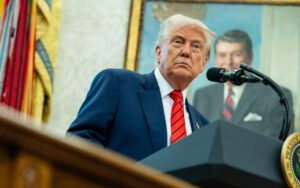As new tariffs and ongoing economic uncertainty continue to loom over the United States, Americans are displaying a marked decrease in spending habits. This shift is evident in various areas such as dining out, hotel stays, and other discretionary expenses. The impact of these cautious actions reveals the apprehension many individuals feel about their financial security in the face of a turbulent economic climate.
One of the main reasons behind this decline in spending is the anticipation of new tariffs. With the implementation of these tariffs, businesses and consumers alike are bracing themselves for potential price increases on imported goods. This anticipation has led individuals to curtail their expenses and reduce their discretionary spending.
The apprehension surrounding the new tariffs is compounded by the continued economic uncertainty that has plagued the nation. A long-lasting impact of the pandemic, coupled with ongoing trade tensions and political instability, has left many Americans feeling unsure about their financial stability. In such uncertain times, the prudent step for most individuals is to tighten their purse strings and adopt a more cautious approach to spending.
Real-life examples of this trend are abundant. Families who once enjoyed dining out on weekends or taking vacations are now opting for home-cooked meals and staycations. Similarly, individuals who enjoyed regular shopping sprees or entertainment outings are now cutting back and focusing on essential purchases. This shift in behavior not only reflects a desire for financial prudence but also hints at the anxieties many Americans are experiencing due to the unpredictable economic landscape.
Research findings further support the notion that Americans are spending less as they brace for new tariffs. A recent survey conducted by a reputable financial institution revealed that a significant percentage of respondents expressed concerns about the potential impact of tariffs on their finances. This concern led them to reduce their expenses and adopt a more cautious approach to their financial decisions.
As Americans navigate the uncertainties ahead, it is crucial to acknowledge the broader implications of their reduced spending. This decline in consumer spending can have a profound impact on the economy as a whole, affecting industries such as hospitality, retail, and entertainment. It is vital for policymakers and business leaders to pay attention to these shifting trends and develop strategies to mitigate the adverse consequences.
In conclusion, Americans are displaying a notable decrease in spending habits as they brace themselves for new tariffs and grapple with ongoing economic uncertainty. This cautious approach to spending reflects the anxieties many individuals feel about their financial security in the face of a turbulent economic climate. As these trends continue, it is important for stakeholders to understand the broader implications and work towards innovative solutions that promote economic stability and consumer confidence. Only through proactive measures can we navigate these testing times and emerge stronger as a nation.









